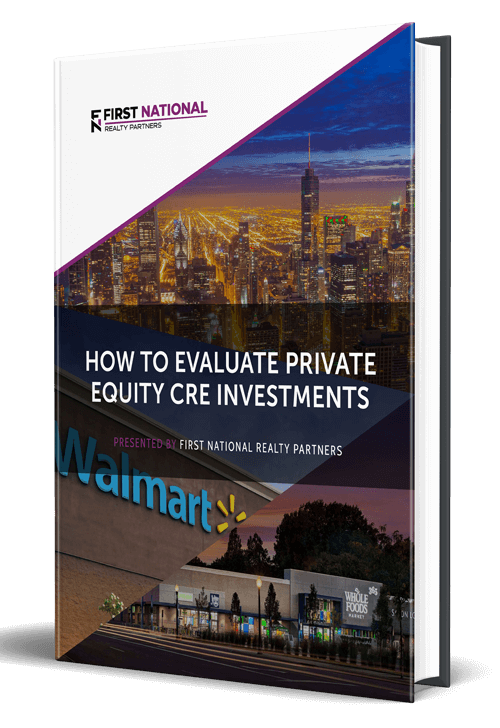There is a common misconception that an investor must have a significant amount of capital in order to invest in commercial real estate. This is true in some cases, but not all.
In this article, we explain what commercial real estate (CRE) is, describe the options for investing in commercial real estate, and highlight the typical minimum investment requirements for each CRE option. By the end, readers will have a detailed understanding of typical minimum investment requirements for each of the major commercial real estate investment options.
At First National Realty Partners, we specialize in the purchase and management of grocery store anchored commercial retail centers. To learn more about our investment opportunities, click here.
Commercial Property vs. Residential Property as Investments
There are two major categories of investment real estate, residential and commercial.
Residential real estate is defined as property that meets two tests:
- It has a residential purpose, meaning that someone lives there; and
- It has less than five units.
So, single family homes, duplexes, triplexes and quadplexes are all considered to be residential properties. Generally, the barriers to entry for a residential investment property are lower, therefore residential real estate tends to be a good fit for first time real estate investors.
But, for investors looking to scale their portfolio by outsourcing key functions like property management, commercial properties may be a more suitable fit.
A commercial property also has two defining characteristics:
- Its space is leased to businesses; and
- The properties are purchased with the intent to earn a return through income and/or price appreciation.
Types of Commercial Property
There are multiple types of commercial property for investors to consider. The four most widely recognized types of commercial real estate for investing are:
- Multifamily: Apartment complexes with five or more units (NOTE: This is the exception to the rule that commercial space is leased to businesses).
- Industrial: Properties with an industrial purpose like warehouses, flex spaces, and self-storage facilities.
- Office: Properties where businesses lease office space. Office buildings can have a general purpose like an accounting firm or a specialized purpose like medical or dental.
- Retail: Properties where retail businesses are located. Common examples include shipping malls and the grocery store anchored retail centers that we invest in.
Given the breadth of commercial property types and differences in real estate investor objectives, there are a number of vehicles and products by which individuals can gain access to commercial real estate assets.
Options for Investing in Commercial Real Estate
There are four ways to invest in commercial real estate, each of which come with their own minimum investment requirements. Details on each are below.
1. Real Estate Investment Trust (REIT)
A REIT is a specialized type of investment company that owns, operates, and/or finances commercial real estate. To invest, individuals can purchase REIT shares, which provides them with a proportionate share of the income and profits produced by portfolio properties. REITs have pros and cons, but they are a popular choice for individual investors because IRS rules require them to pay out a high percentage of their income to shareholders in the form of dividends.
Types of REITs
There are many different types of REITs, each of which come with their own investment strategy. For example, one REIT may focus on multifamily properties while another may focus on industrial assets. In addition, REITs can be privately held or publicly traded. For the purpose of this article, the focus is on publicly traded REITs.
The publicly traded shares of REITs can be bought and sold on public exchanges, which means that they are liquid and they require a relatively low minimum investment amount. For example, the largest publicly traded REIT in the United States is American Tower (Ticker: AMT), which owns and operates communications infrastructure equipment. As of this writing, a single share of AMT can be purchased for $264. In return, shareholders can expect to earn $5.24 in annual dividends for each share, which equates to a 2% dividend yield.
Benefits of REITs for New Investors
For new investors, purchasing shares of a publicly traded REIT is likely the most accessible commercial real estate investment option because their shares are relatively inexpensive and they can be bought and sold by anyone with a brokerage account.
2. Real Estate Investment Group (REIG)
The next most accessible option for individual investors is to join a real estate investment group (REIG).
A REIG is a group, formed by individual investors, that comes together to pool their money for the purposes of crowdfunding their real estate investment. Structurally, a REIG is similar to a mutual fund in the sense that commercial real estate investors can purchase “units” in an operating company, which owns the property. Each unit entitles the investor to their proportionate share of the cash flow and profits produced by the property.
Minimum Investment Requirements of a REIG
Each REIG is different, so they may have differing minimum investment requirements, but REIGs typically range from $5,000 – $50,000. Therefore, a REIG requires a higher minimum investment than a REIT, but it is still less than the next option which is a private equity firm.
3. Private Equity Firms
As their name suggests, private equity firms are privately held companies who invest in the equity of other companies, including those that own real estate.
In a typical transaction, a private equity firm finds a property they would like to purchase and they form a separate legal entity, an LLC, to do so. To finance the purchase, the firm arranges debt with a lender and sells shares in the LLC to raise the equity needed to cover the difference between the purchase price and debt.
From a legal standpoint, the shares in the LLC are considered “securities.” But, their issuance relies on an exemption that does not require the issuer (the private equity firm) to register the offering as long as they are sold to “accredited investors” only. An accredited investor is defined as one who meets minimum net worth and/or income requirements.
Accreditation and Minimum Investment Requirements with Private Equity Firms
Because of the accreditation requirement, an investment with a private equity firm has higher barriers to entry. In addition, the minimum investment usually starts around $25,000 and can rise to $100,000 or higher in some cases. For these reasons, private equity investments are most suitable for high net worth investors seeking passive income.
4. Buying Property
Finally, the investment option with the highest barriers to entry is buying a rental property directly. In this case, an investor will find their own real estate deals, perform their own due diligence, and come up with their own down payment. For this reason, buying a property is expensive both in terms of the amount of money needed and the time required to do so. For example, the property owner is responsible for ensuring that all operating expenses, like property taxes and maintenance costs, are paid. In addition, they are responsible for ensuring that vacancy rates are low and negotiating all lease terms for new and renewing tenants.
Minimum Investment Requirements to Buy Commercial Property
Although it can vary by deal, a general rule is that commercial properties require a down payment of ~20%. So, for example, if an investor wanted to purchase an apartment building for $1MM, they would need a down payment of $200,000 and the know-how to operate and manage the property once the transaction is closed. For this reason, buying a commercial property is typically most suitable for investors with significant financial resources, the time to manage the property, and detailed knowledge of local commercial real estate markets to ensure it is a good purchase.
Summary & Conclusion
- A commercial investment property has two defining characteristics. First, it is purchased with the intent to earn a return through rental income and/or capital appreciation. Second, the space in the property is leased to other businesses.
- Broadly, there are four types of commercial property: office, retail, industrial, and multifamily. Each has their own operational quirks and require specific expertise to operate.
- For individual investors wondering how to invest in commercial real estate, there are also four ways, each of which come with their own requirements and minimum investment amounts.
- Purchasing shares in a REIT has the lowest barriers to entry. Investors need a brokerage account and enough money to purchase at least 1 share of the REIT, often less than $250.
- Investors could also join a Real Estate Investment Group (REIG), which is a group of investors who pool their money to invest in real estate. The group sets the minimum investment requirement, but it is often in the range of $5,000 – $50,000 per deal.
- The third option is to partner with a private equity firm, but the barriers to entry are higher. First, investors must meet minimum income and/or net worth hurdles to be accredited. Second, the minimum investment requirement is higher, often $25,000 up to $100,000 or more per deal.
- Finally, real estate investors also have the option to purchase a commercial property directly. But, this route is expensive both in terms of the required down payment and the time needed to manage the property.
- Given the breadth of commercial property investment options, it is in the best interest of each investor to study the options and to choose the one that is most suitable for their personal risk tolerance, time horizon, and return objectives.
Interested In Learning More?
First National Realty Partners is one of the country’s leading private equity commercial real estate investment firms. With an intentional focus on finding world-class, multi-tenanted assets well below intrinsic value, we seek to create superior long-term, risk-adjusted returns for our investors while creating strong economic assets for the communities we invest in.
If you would like to learn more about our commercial real estate investment opportunities, contact us at (800) 605-4966 or info@fnrealtypartners.com for more information.






